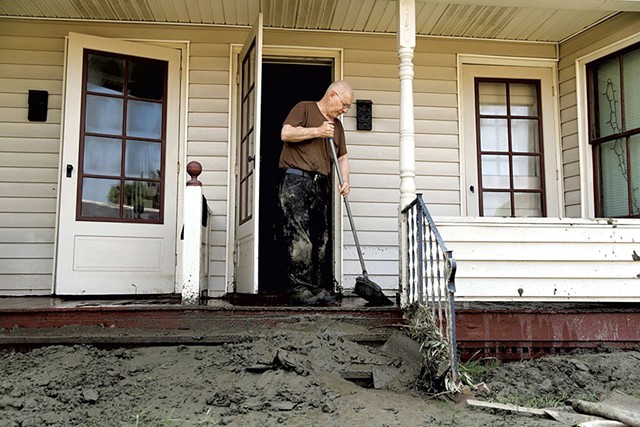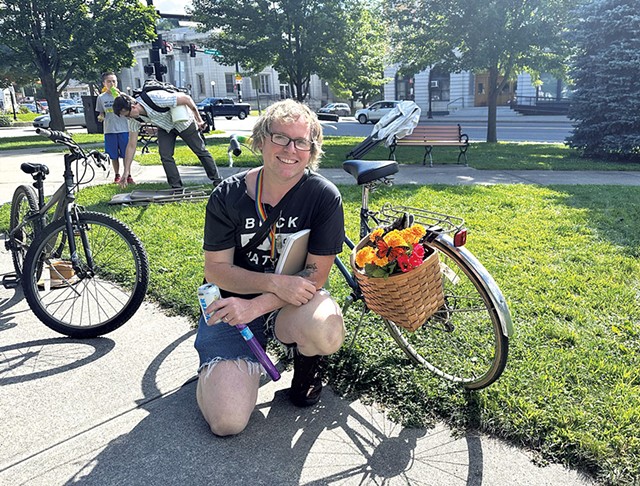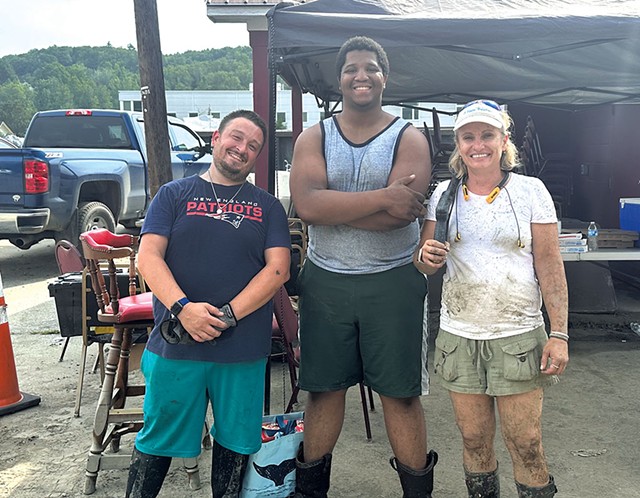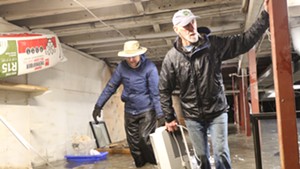
- Courtesy of Shannon Alexander
- Gordon George cleaning his front porch
Anne Ward prefers to keep her home and work lives separate. But the two collided on July 10 as torrential rain clobbered central Vermont.
Facing the possibility of flooding in her Berlin home, Ward sought safety with her 4-year-old son and 12-year-old foster daughter at her office, the sexual-violence-prevention nonprofit Mosaic Vermont, in downtown Barre. That afternoon, she watched in disbelief as the Stevens Branch of the Winooski River overflowed, turning Main and Cottage streets into fast-flowing waterways, submerging the water heater and furnace in Mosaic's basement, and destroying a low-lying, wheelchair-accessible apartment that housed members of a family who had fled domestic violence.
Unbeknownst to Ward, floodwaters had also upended a newly filled oil tank at her home, instantly rendering it a hazmat zone.
Some six weeks after the historic storm that devastated parts of Vermont, Ward, a single parent, still faces uncertainty on both personal and professional fronts. She doesn't know when, or if, her family will be able to return home, though she has a temporary place to stay nearby, thanks to a pet-sitting gig. She's on the hunt for longer-term housing so that her children can settle in before the school year begins.
At Mosaic, where Ward serves as executive director, the flooded emergency-housing unit has been mucked out and stripped down to the studs by volunteers who poured in to Barre to help. In addition to applying for flood-recovery grants, Ward recently launched a fundraising campaign to help pay for replacing Mosaic's utilities and moving them out of the basement.
Ward said she's been running on adrenaline since the flood. But as the rush subsides, she and others in Barre are beginning to think about long-term recovery, especially for the city's most vulnerable.
Part of that recovery is financial. City officials now estimate that 363 structures containing 517 housing units were damaged by the flood, mostly in Barre's lower-income North End. Getting those units back online in the city of 8,500, which Barre Mayor Jake Hemmerick said is his top priority, is a costly proposition.
But other aspects of recovery are harder to quantify: the trauma of the flood itself and the displacement and isolation it has created.
The kid who lost his beloved pet fish. The fiercely independent senior citizen now relying on his adult daughter for everything. The mother worried about the mold starting to grow on the walls. The family who will never sleep in their familiar beds again.
"The real damage of the flood is less tangible and difficult to pin down from an institutional or governmental lens," said Shawn Trader, executive director of Rainbow Bridge Community Center, a Barre-based LGBTQ+ support organization that coordinated volunteers and distributed food and supplies in the flood's aftermath. "Money ... can't replace security and safety and comfort."

- Alison Novak
- Shawn Trader, executive director of Rainbow Bridge Community Center
In the weeks following the disaster, Rainbow Bridge staff and volunteers created a rapid-response team. They tried to keep things light, providing bubbles and sidewalk chalk, while also figuring out what the community needed — despite lacking water and electricity in their North Main Street headquarters. Now, the nonprofit is moving into a new phase, Trader said, with monthly Community Cares Days during which Barre residents will be able to meet with Vermont Legal Aid representatives, mold-remediation experts, art therapists and grief counselors. The first is planned for September 17.
Ward said she's also been considering what her organization — which provides a range of services, from a 24-hour helpline for those experiencing sexual violence to prevention work in schools — can do to help the community recover.
"It's not just what we build back or how we build back," Ward said. "It's what do people need in order to feel safe ... to start to repair emotionally?" What makes that question especially challenging, she added, is that every person affected by the flood has their own complex set of needs.
Kaelynn Rouleau is one of them. For the past three years, the 21-year-old Applebee's waitress has been caring for two teenagers — relatives of her fiancé — whom she helped remove from unsafe conditions at home in Virginia. On July 10, she was at home with one of them, 17-year-old Jaquan Johnson, when the water neared their first-floor duplex rental on Granite Street. The two popped their Maine coon cats, Nutmeg and Caramel, into backpacks and started to walk to Rouleau's aunt's house, on higher ground in Barre.
What Rouleau and Johnson thought would be a one-mile trek turned into an hours-long ordeal as they encountered chest-high water and impassable roads.
"There was a point where I thought we were going to get swept away," Rouleau said. She recalled trying to maintain her composure for Johnson, who isn't a strong swimmer and is afraid of water.
Eventually, Rouleau's fiancé and his boss picked up the pair in a truck and took them to the aunt's home, where they were reunited with other family members.
Still shaking from their cold, wet journey, they hugged and cried.
Their home is no longer habitable, and their landlord has told them she is not sure whether she will rehab it. So, for now, Rouleau's family of four is crashing on air mattresses in her aunt's living room.
Rouleau, who has picked up extra shifts at Applebee's to save up money for a new place and other needs, knows the arrangement isn't sustainable. But she's having no luck finding an affordable rental that can accommodate her family.
"It's superhuman — the way that these people have continued to carry on and just know that there will be better days for them," said Barre City Councilor Michael Deering, who has set up a GoFundMe account for the family.

- Alison Novak
- From left: Barre City Councilor Michael Deering, Jaquan Johnson and Rep. Gina Galfetti
Johnson, who is student council president and cocaptain of the football team at Spaulding High School, wonders what the beginning of his senior year will look like amid so much instability and loss.
Barre has been a great place to live, he said. He recalled how Two Loco Guys, a downtown Mexican restaurant, would stay open late so that the football team could get burritos after a game, and how a young woman who worked at Maria's Bagels would sometimes toss him a free bagel with cream cheese as he walked to school.
"People around here don't have to do stuff like that," Johnson said, "but it's the community."
Relying on family members is a common theme for flood survivors. Danielle Palmer, a teacher who lives in the town of Washington, has spent the past month trying to help her 73-year-old father, Gordon George, navigate his own losses.
George, who retired from IBM and works nights at Walmart, rode out the storm alone, seeking refuge on the second floor of his home on the corner of North Main and Blackwell streets. He refused to get into a rescue boat that came in the middle of the night because he's a "stubborn, old Vermonter," Palmer said.
When she was able to get to her father's house the next day, Palmer found him sitting in a chair, surrounded by his ravaged belongings.
"I've never seen shock on anyone's face like I did on Dad's," Palmer said.
That week, Palmer said she served as her dad's "brain," helping him move his sodden belongings to the curb, contacting government agencies and urging state representatives to visit so they could see the damage firsthand.
After four nights of sleeping in his flooded home, which he has owned for 14 years, George agreed to relocate temporarily to his daughter's place. He doesn't use social media or have a smartphone, Palmer said, so it was only then that he started to get a sense of the widespread devastation.
Palmer said she wishes that there had been more effort by city and state government to reach displaced people such as her father, if only to let them know they weren't forgotten. She said she's looking forward to the day when her dad is settled again and she can "go back to being his daughter."
Barre City Manager Nicolas Storellicastro said the human toll of the flood isn't far from his mind as he tends to more practical matters such as road paving, trash collection and building inspections.
"My heart breaks for the children who are impacted, many of whom just went through two difficult years because of COVID and were finally getting back to 'normal,'" Storellicastro said.
The city is trying to do its part to restore "traces of normalcy," he said. The Saturday after the flood, for example, officials reopened the municipal swimming pool so that community members would have a place to congregate. The Barre Farmers Market and Currier Park concert series resumed soon after.
Storellicastro said that because trauma often leads to other problems, such as substance use, mental health emergencies and domestic violence, it's in the city's best interest to work with local agencies and residents to provide support.
Ward, of Mosaic, said she's observed that many in the city, even those who've experienced loss themselves, have focused on helping others.
For them, it's a way to cope with what's happened.
There's Adam Jacobs, a downtown resident and fifth-grade teacher at Barre City Elementary & Middle School, who was preparing for a vacation out of state when the flood hit. Instead, he stayed home to volunteer with the American Red Cross and Rainbow Bridge. He's since been hired by the city as a part-time volunteer coordinator, helping to organize tasks such as debris removal.
Jacobs, who went without electricity and hot water in his fourth-floor apartment for more than a week, said he was inspired by The Plague, the 1947 novel by Albert Camus that explores human reactions to a challenging event. Some people try to escape, while others confront the challenge head-on. "The book compelled me to stay," Jacobs said.
There's Amy Anderson, who runs Amy's Armoire, a nonprofit dedicated to helping foster and adopted children. The thrift store Anderson operates on Barre's North Main Street was water damaged, so she's been working out of a warehouse space she rents in an unscathed part of the city. In the weeks after the flood, Anderson gave families the electronic door code to her store so they could come in and take whatever they needed, while her volunteers distributed clothing at local churches.
There's Renita Marshall, whose organization, the Renita Marshall Helping Hands Foundation, has ramped up efforts to provide fully stocked backpacks and new clothes and shoes to students harmed by the flood ahead of the new school year.
And there's 17-year-old Jaquan Johnson. Two days after he lost everything — including his betta fish, Marco — Johnson gathered his "boys," fellow Spaulding football players, and headed downtown to help haul debris and spray down the shelves of local businesses.
Johnson recalled getting out of a truck at Yipes! of Central Vermont, an automotive store on North Main Street, and asking employees where they were needed.
They initially looked confused, Johnson said, until he told them: "We're here to help you."













Comments
Comments are closed.
From 2014-2020, Seven Days allowed readers to comment on all stories posted on our website. While we've appreciated the suggestions and insights, right now Seven Days is prioritizing our core mission — producing high-quality, responsible local journalism — over moderating online debates between readers.
To criticize, correct or praise our reporting, please send us a letter to the editor or send us a tip. We’ll check it out and report the results.
Online comments may return when we have better tech tools for managing them. Thanks for reading.